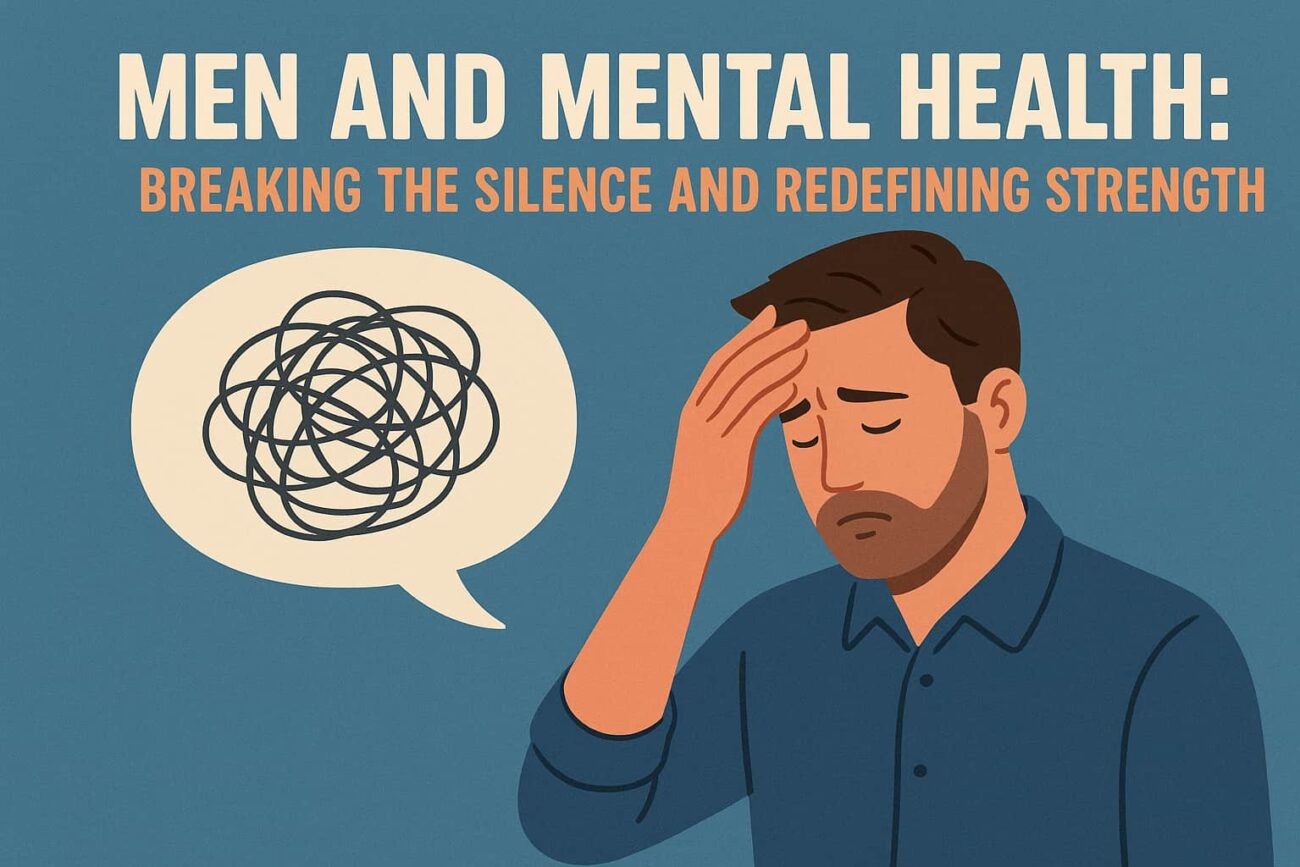Men and mental health has become one of the most important things in recent years. For too long, men were expected to stay silent about their struggles because of stigmas, it can lead to stress, depression in men, and anxiety. Society often teaches men to become strong-minded people, but the real strength lies in acknowledging emotions, asking for help, and supporting one another.
The truth is that millions of people are suffering silently. Recent studies shows that men are far less likely than women to seek therapy, even when struggling with depression or anxiety. This silence can lead to higher risks of substance abuse, loneliness, and even suicidal thoughts. That is why men’s mental health awareness is crucial, not only to help individuals heal but also to reshape the way society views masculinity.
Why Men’s Mental Health Is Different
There is no denying that men experience mental health struggles differently. While women are generally more expressing of emotions, men often bottle them up. This difference is shaped by cultural expectations, social stigmas, and family pressures.
Key Factors Affecting Men’s Mental Health
- Cultural belief that men should not show weakness.
- Pressure to be the “provider” or “protector.”
- Fear of judgment from peers or family.
- Lack of role models openly discussing mental health.
This silence has created a generation where many men continue to fight battles behind closed doors. But the rise of mens mental health online platforms is becoming the narrative. Today, men have access to therapy apps, online communities, and resources that provide a safe space to open up.
Depression in Men: Signs Often Missed
One of the main challenges is recognizing depression in young men. Unlike women who may openly talk with their loved ones about sadness, men’s depression often shows up differently. Instead of crying or withdrawing, men may display irritability, anger, or reckless behavior.
Common Signs of Depression in Men
- Constant irritability or anger
- Sleeping too much or too little
- Drinking alcohol or using drugs excessively
- Loss of interest in hobbies or relationships
- Difficulty focusing at work or studies
Unfortunately, these signs are often dismissed as “normal male behavior,” when in reality they are cries for help.
The Stigma Around Men and Mental Health
The biggest thing was stigma; like, from our childhood, boys are told to “man up” or “don’t cry.” These messages stick, making adult men feel ashamed of expressing vulnerability. But silence does more than good. If you are struggling with mental health, you must go to professionals; otherwise, it’s getting worse than ever.
The truth is seeking help is not weakness. Going to therapy, talking with your friend, or joining an online support group is a sign of courage. By speaking up, men are breaking the stigma and showing younger generations that mental health is not only for men; it’s for everyone those who struggling.
Men’s Mental Health Awareness Campaigns
To fight this silence, several awareness campaigns have emerged worldwide. For example:
- Movember Foundation: Spreads awareness about men’s health issues, including mental health.
- HeadsUpGuys: Offers online resources tailored to men battling depression.
- National Men’s Mental Health Month (June): A global push to bring attention to male mental health challenges.
These campaigns are helping normalize conversations and making it easier for men to share their stories.
How Online Support Is Changing the Game
Now a days theinternet has become a life’s priority thing. Platforms for men’s mental health online provide easy access to therapy, community forums, and anonymous discussions. This digital support allows men to seek help without the feeling of being judged.
Here’s a quick table comparing traditional vs. online support for men’s mental health:
| Aspect | Traditional Support (In-person) | Online Support (Apps/Forums) |
|---|---|---|
| Accessibility | Limited by location & time | Available 24/7, anywhere |
| Comfort level | Fear of being seen/judged | Anonymous & private |
| Cost | Often expensive | More affordable options |
| Community | Limited peer groups | Global communities |
This shift shows that technology can play a huge role in reducing stigma and providing safe help.
Breaking the Silence: What Men Can Do
Change starts small. Each man has the power to rewrite what strength means. It does not mean hiding pain but instead being open and honest.
Here are simple steps men can take to prioritize mental health:
- Talk to a trusted friend or family member.
- Explore therapy—in person or online.
- Practice healthy routines like exercise and journaling.
- Reduce alcohol or substance dependence.
- Join men’s mental health support groups.
By encouraging open discussions, supporting awareness campaigns, and making use of men’s mental health online platforms, we can ensure that no man feels alone in his battle.
Final Thoughts
Men and mental health is not just a conversation; it’s a movement. The more we talk about it, the more we dismantle stigma. Whether it’s depression in men, depression in young men, or the general silence around masculinity, change begins with awareness.
If you are a man struggling right now, know this: you are not weak. Your mental health matters. Breaking the silence is your first step toward real strength.

Greetings! Very helpful advice on this article! It is the little changes that make the biggest changes. Thanks a lot for sharing!
Okay, f168okvip is giving off some VIP vibes. Let see if it’s worth the hype. Worth a look if you’re looking for something a bit different.
Great web site. Lots of useful information here. I am sending it to a few buddies ans also sharing in delicious. And of course, thank you to your effort!
I will right away grab your rss as I can’t find your e-mail subscription link or e-newsletter service. Do you’ve any? Please let me know in order that I could subscribe. Thanks.
so much wonderful info on here, : D.